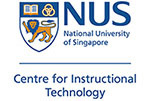CIT and Faculty of Engineering have launched a new active learning classroom at the E4-04-04. This classroom, enhanced with audio-visual equipment and mobile furniture, is designed to support project & inquiry-based group discussions and class presentations.
- Active Learning Classroom – Control Panel and Visualiser
- Overview of Active Learning Classroom
- Mobile furniture, group screen and group whiteboard
- Laptop and Control Panel
- View of presenter’s table, and tables 1 and 2
- View from presenter’s table
- Presenter’s table
- Control panel and visualiser
- Front of active learning classroom
- View from table 2
- View of tables 3 and 4
- Table with computing devices
- Computing devices on table
- View of tables 5 and 6
- Aerial view of active learning classroom
- Panoramic view of active learning classroom



















